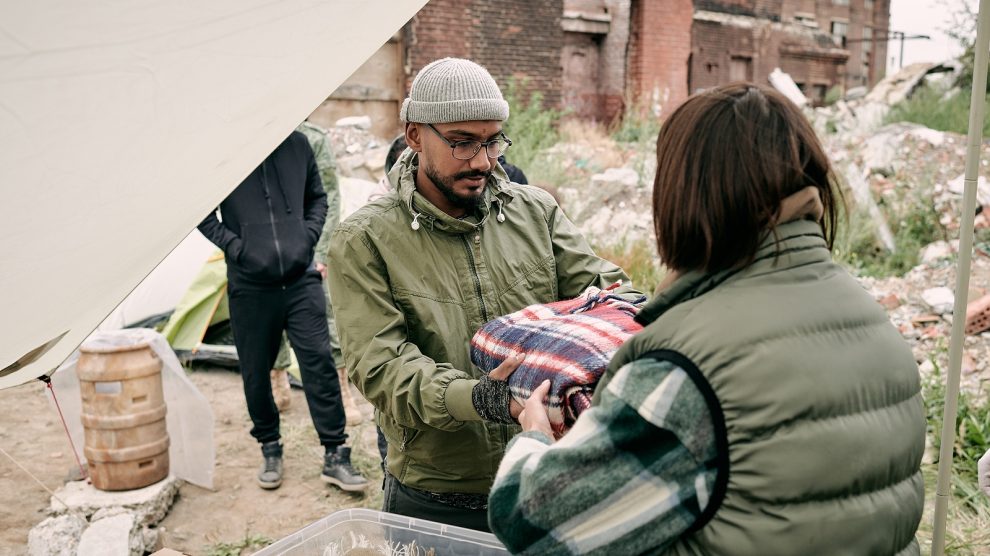Poland has responded to the large numbers of refugees trying to enter country, facilitated by the Alexander Lukashenko regime in Belarus, by taking action against those providing them with assistance. This has not stopped a growing number of Poles from helping those in need.
Groups of refugees hoping to enter the European Union continue to be stuck on the Belarus-Poland border despite the harsh winter conditions.
According to the most recent estimates by the Polish government there are still 7,000 people in Belarus planning to cross into EU territory.
- Migrants are not weapons: Stop viewing them as such
- Poland and the EU are compounding the Belarus border crisis
- Poland needs Ukrainians. It should do all it can to help them settle
In late November, the Polish authorities arrested three individuals, including one German citizen, for providing assistance to refugees moving from Belarus to Poland.
Marta Górczyńska, a human rights lawyer working for the Helsinki Foundation for Human Rights and Grupa Granica, an informal initiative established in the beginning of August to provide legal and humanitarian assistance to migrants, says that border guards and military personal are now suggesting those providing any kind of assistance to the refugees are breaking the law.
However, Górczyńska, who is currently on the border, tells Emerging Europe that this has not stopped Poles from actively seeking to provide help those in most dire need of it.
“Polish society is polarised when it comes to the situation right now,” Górczyńska acknowledges.
“The official government stance is that this is a situation that concerns national security. That this is a political crisis and that the situation on the border might erupt into something more critical and dangerous. As a result, we have people who are not willing to help the refugees and who are actively supporting the actions of the border guards by pushing people back to Belarus,” she says.
However, this is far from an exhaustive picture of the attitudes and actions of wider Polish society.
“We also see a lot of beautiful example of people providing assistance in very harsh conditions in this forest,” the human rights lawyer asserts.
Górczyńska herself is working along the 400-kilometre border between Belarus and Poland, constantly moving from one border crossing point to another, depending on where her and her team’s assistance is needed most.
As part of her project, she has witnesses countless instances of people from all over the country coming together to provide a helping hand to the refugees.
Assisting those in need
According to Górczyńska’s accounts, the volunteers in question are largely private individuals, locals living near the border who walk the forests and meet with the people who need assistance.
“They are bringing them warm sleeping bags, hot soup and tea. Money has been raised to buy winter equipment and to bring it to the forest as most of these people are not at all prepared for the winter conditions in the Polish forests,” she says.
Amongst the locals willing to provide aid are many local doctors passionate about providing assistance to people in a critical conditions.
An initiative for voluntary doctors working on the border has been operating for two months. They have set up their own private ambulance with equipment bought through fundraising. Now they are going to the forests every day to provide medical assistance to people in need.
And it’s not just locals setting up grassroots organisations and being ready to be of help: initiatives have been set up all across the country to collect essential goods and to redistribute them on the border.
Understanding the refugees
“The people I am working with mostly come from Iraq, Syria, Yemen and Afghanistan. A lot of them are fleeing persecution in their country, mass human rights violations or individual violations,” Górczyńska says.
“I have met a lot of journalists, opposition members, people who are simply do not agree with the authorities in their country of origin. We have a lot of people who want to join their families somewhere in Western Europe. These are people who are looking for safety for their children and their families,” she continues.
According to Martyna Zimniewska of Grupa Zagranica, a Polish network of NGOs working in the field of development and humanitarian aid and global education, and currently supporting the activities of Grupa Granica, demystifying and securitising the people seeking asylum is necessary to getting more people in Poland to join those with a more sympathetic response to the ongoing situation.
“Official Polish assistance is hugely insufficient and there is a growing importance of introducing global education in Polish schools, currently hardly present, which would ensure better understanding of global processes such as human rights violations, migration, global crises and would contribute towards creating a more compassionate society,” she tells Emerging Europe.
Unlike many news and information platforms, Emerging Europe is free to read, and always will be. There is no paywall here. We are independent, not affiliated with nor representing any political party or business organisation. We want the very best for emerging Europe, nothing more, nothing less. Your support will help us continue to spread the word about this amazing region.
You can contribute here. Thank you.








Add Comment